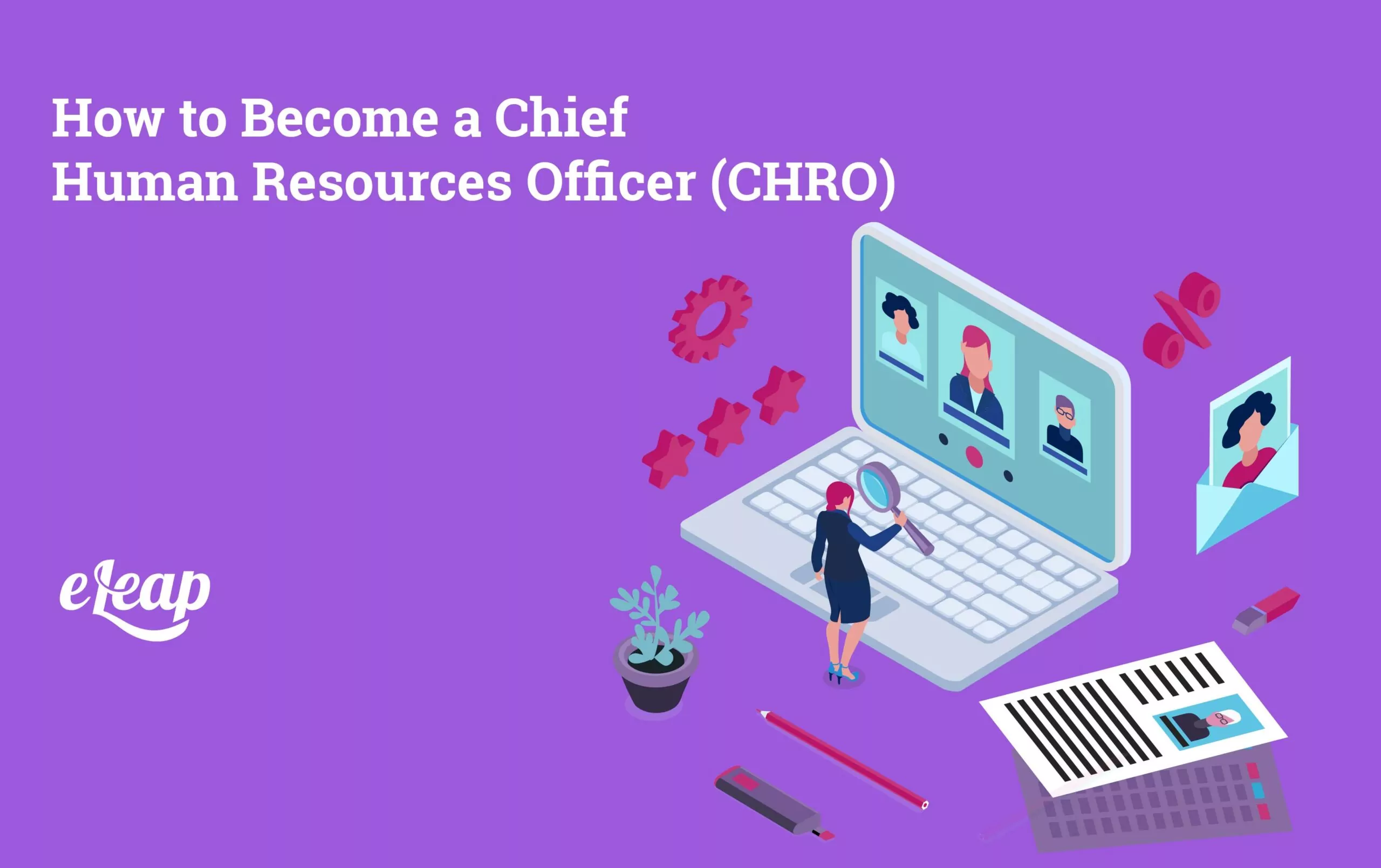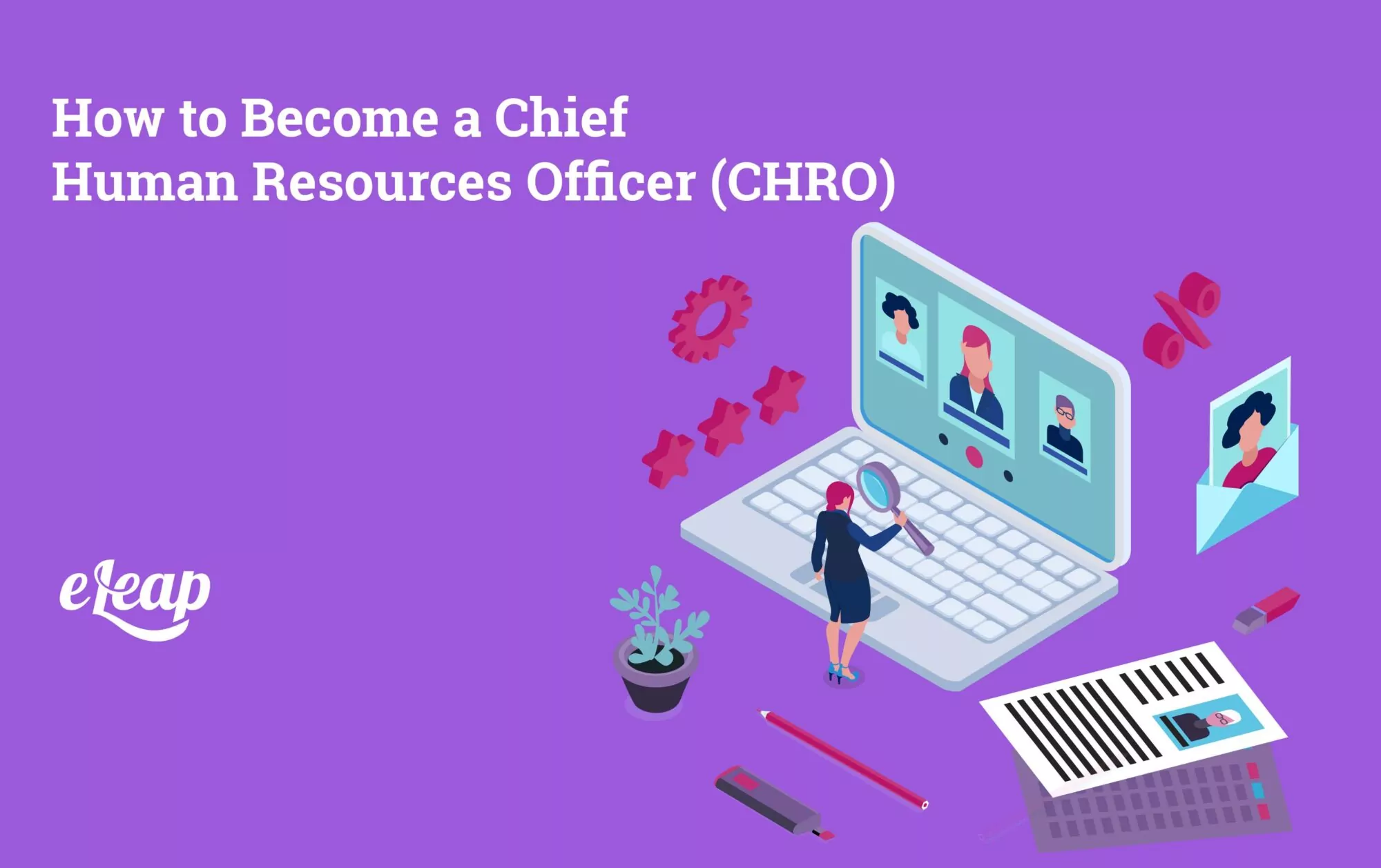How to Become a Chief Human Resources Officer (CHRO)

Climbing the corporate ladder to become a Chief Human Resources Officer (CHRO) is a significant achievement, combining extensive HR knowledge with strategic leadership skills. The CHRO shapes the workforce and drives the organization’s culture and talent strategy. If you intend to reach this top-tier HR position, understanding the required educational background, career trajectory, and essential skills is crucial. This guide will provide a comprehensive roadmap to help you on your journey to becoming a successful CHRO. See how eLeaP’s Performance Management Platform helps you apply these insights to drive better results.
Educational Requirements
Obtaining the right educational qualifications is essential to starting your journey toward becoming a CHRO. Most CHROs hold a bachelor’s degree in Human Resources, Business Administration, or a related field. However, many top executives further their education with a master’s degree, such as an MBA, focusing on Human Resources or Organizational Development. Additionally, professional certifications like the SHRM-CP or SHRM-SCP, offered by the Society for Human Resource Management, can enhance your credibility and demonstrate your expertise in the field.
Recommended Fields of Study

Programs in business management, psychology, organizational behavior, and labor relations provide a strong foundation. Understanding the legal aspects of HR, such as employment law and compliance, is also critical. Advanced studies in leadership, strategic management, and finance can equip you with the skills to make high-level decisions and contribute to the organization’s strategic goals.
Gaining Experience
Early Career Steps in HR
Your path to becoming a CHRO begins with gaining practical experience in human resources. Entry-level positions such as HR assistant or HR coordinator allow you to learn the basics of HR functions, including recruitment, employee relations, benefits administration, and compliance. These roles provide hands-on experience and an understanding of the day-to-day operations of the HR department.
Important Skills and Competencies
Developing a wide range of skills is crucial as you advance in your HR career. Key competencies include strong communication and interpersonal skills, problem-solving abilities, and a deep understanding of HR technologies and data analytics. Leadership and the ability to influence others are also vital, as you will guide and inspire your team and the broader organization.
Building a Track Record of Success
To stand out as a CHRO candidate, you must demonstrate a history of successful HR initiatives and projects. This could involve implementing new HR systems, leading organizational change initiatives, or developing effective talent management strategies. Documenting your achievements and showcasing the impact of your work on the organization’s performance will be crucial when competing for executive positions.
Advancing in the HR Field
Mid-Level HR Positions and Responsibilities
As you progress in your career, you’ll likely move into mid-level HR roles, such as HR manager or HR director. These positions involve more responsibility, including overseeing HR teams, developing policies and procedures, and aligning HR strategies with organizational goals. Gaining experience in various HR functions, such as compensation and benefits, talent acquisition, and employee development, will broaden your expertise and prepare you for senior leadership roles.
Key Milestones and Achievements
Achieving key milestones, such as successful mergers and acquisitions, large-scale recruitment drives, or significant employee engagement and retention improvements, can highlight your capabilities as a strategic HR leader. These accomplishments demonstrate your ability to handle complex challenges and drive positive organizational outcomes.
Developing Leadership Skills
Leadership is a critical component of the CHRO role. Participating in leadership development programs, attending workshops, and seeking mentorship opportunities can help you refine your leadership style. Understanding different leadership theories and applying them in practice will enhance effectively your ability to lead and manage diverse teams.
Strategic Thinking and Decision-Making
CHROs are expected to contribute to the organization’s strategic direction. Developing strategic thinking skills involves understanding the broader business context, identifying trends and opportunities, and making informed decisions that align with the organization’s long-term goals. Engaging with senior executives and participating in strategic planning sessions can provide valuable insights and experience.
Networking and Professional Development
Building a strong professional network is essential for career advancement. Networking with other HR professionals, attending industry conferences, and joining professional associations provide opportunities for learning and growth. These connections can also lead to job opportunities and valuable advice from experienced HR leaders.
Joining HR Associations and Attending Conferences
Professional associations like the Society for Human Resource Management (SHRM) offer resources, training, and networking opportunities. Attending HR conferences and events allows to stay updated on the latest trends, best practices, and innovations in the field. Engaging with thought leaders and peers can inspire new ideas and approaches in your work.
Seeking CHRO Opportunities
When you’re ready to pursue CHRO positions, it is necessary to have a targeted job search strategy. Leverage your professional network, utilize online job boards, and work with executive search firms specializing in HR roles. Tailor your resume and cover letter to highlight your leadership experience, strategic achievements, and alignment with the organization’s values and goals.
Preparing for Interviews and Assessments
Interviews for CHRO roles often include behavioral and situational questions to assess your leadership capabilities and strategic thinking. Be prepared to discuss your career achievements, how you’ve handled challenges, and your vision for the HR function. Practicing your responses and seeking feedback from mentors or colleagues can help you present yourself confidently and effectively.
Key Responsibilities of a CHRO
As a CHRO, you’ll oversee all HR functions within the organization. This includes managing HR teams, developing and implementing HR policies and procedures, and ensuring compliance with employment laws and regulations. Effective leadership and management skills are crucial to fostering a positive and productive HR environment.
Developing HR Policies and Strategies
A key responsibility of the CHRO is to develop and implement HR policies and strategies that align with the organization’s goals and values. This involves working closely with senior executives to understand business needs, identifying HR priorities, and creating initiatives that support talent acquisition, development, and retention.
Ensuring Compliance with Employment Laws
Compliance with employment laws and regulations is critical to the CHRO role. This includes staying updated on changes in labor laws, ensuring that HR practices adhere to legal requirements, and mitigating risks related to employee relations and workplace safety.
Challenges and Rewards
CHROs face numerous challenges, including managing organizational change, addressing talent shortages, and fostering a diverse and inclusive workplace. Balancing strategic initiatives with day-to-day HR operations requires strong time management and problem-solving skills. Navigating effectively through these challenges can position you as a trusted and impactful leader within the organization.
Rewards and Benefits of the Role
Despite the challenges, the CHRO role offers significant rewards. As a CHRO, you can shape the organization’s culture, influence strategic decisions, and contribute to its success. The role also provides a platform to drive positive change and make a lasting impact on the workforce.
Conclusion
Becoming a Chief Human Resources Officer (CHRO) requires a combination of education, experience, leadership skills, and strategic thinking. By following the steps outlined in this guide, you can build a successful career in HR and achieve your goal of becoming a CHRO. Continuous learning and professional development are key to staying ahead in this dynamic field. With dedication and perseverance, you can make a significant impact as a CHRO and contribute to the growth and success of your organization.